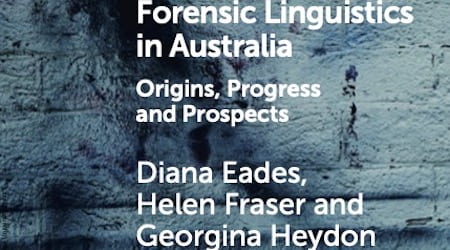
‘Forensic Linguistics in Australia’ – free download till 7 June 2023
A new title in Cambridge Elements in Forensic Linguistics is available for free download till 7 June 2023, namely Forensic Linguistics in Australia: Origins, Progress and Prospects by Diana Eades, Helen Fraser and Georgina Heydon.
Here is the book announcement circulated by the authors:
Cambridge Elements is a newish monograph series publishing concise, original, succinct, authoritative, peer-reviewed, scholarly work on a wide range of disciplines.
Australian linguists will recognise many of their colleagues in our account of the field of forensic linguistics in Australia, written for scholars and students in both linguistics and law, as well as legal professionals, and other interested scholars and professionals. We appreciate the valuable assistance from a number of our Australian linguistics colleagues (see page 87).
For free download (till 7 June 2023), go to the book’s website at: https://doi.org/10.1017/9781009168090, and click Save pdf, just below the Summary.
Diana Eades, Helen Fraser, Georgina Heydon
Note: You can now also listen to a podcast by the authors.
Summary of the Element
This Element presents an account of forensic linguistics in Australia since the first expert linguistic evidence in 1959, through early work in the 1970s-1980s, the defining of the discipline in the 1990s, and into the current era. It starts with a consideration of some widespread misconceptions about language that affect the field and some problematic ideologies in the law, which underly much of the discussion throughout the Element. The authors’ report of forensic linguists’ work is structured in terms of the linguistic, interactional and sociocultural contexts of the language data being analysed, whether in expert evidence, in research, or in practical applications of linguistics in a range of legal settings. The Element concludes by highlighting mutual engagement between forensic linguistic practitioners and both the judiciary and legal scholars, and outlines some of the key factors which support a critical forensic linguistics approach in much of the work in the authors’ country.
Here’s the free download link again, available till 7 June: https://doi.org/10.1017/9781009168090.
Here’s the official reference:
Table of Contents
1. Introduction
1.1 Introducing This Element
1.2 What Is Forensic Linguistics?
1.3 Forensic Linguistics in Australia
1.4 Characteristics of Forensic Linguistics in Australia
2. Misconceptions and Problematic Ideologies
2.1 Misconceptions in Linguistics about the Law
2.2 Misconceptions in the Law about Language and Speech
2.3 Problematic Language Ideologies
3. Linguistic Contexts
3.1 Forensic Transcription
3.2 Forensic Speaker Recognition
3.3 LADO
3.4 Authorship Attribution
3.5 Legal Language, Trademarks and Linguistic Evidence about Meaning
3.6 Linguistic Repertoires and Language Diversity
3.7 Laws about Language
4. Interactional Contexts
4.1 Investigative Interviewing
4.2 Courtroom Communication and Beyond
5. Sociocultural Contexts
5.1 Culture of Law(s)
5.2 Socioculturally Specific Challenges Impacting Interaction
5.3 Other Socioculturally Specific Assumptions
6. Engagement, Expansion and Expectation
6.1 Introduction
6.2 Engagement of the Judiciary and Legal Profession with Forensic Linguistics
6.3 Recognition in Law of Specific Australian Forensic Linguistics Work
6.4 Engagement of Law Enforcement with Forensic Linguistics
6.5 Interdisciplinary Engagement of Forensic Linguists
6.6 International Engagement of Forensic Linguists
6.7 Conclusion
Here’s the free download link once more, available till 7 June: https://doi.org/10.1017/9781009168090.